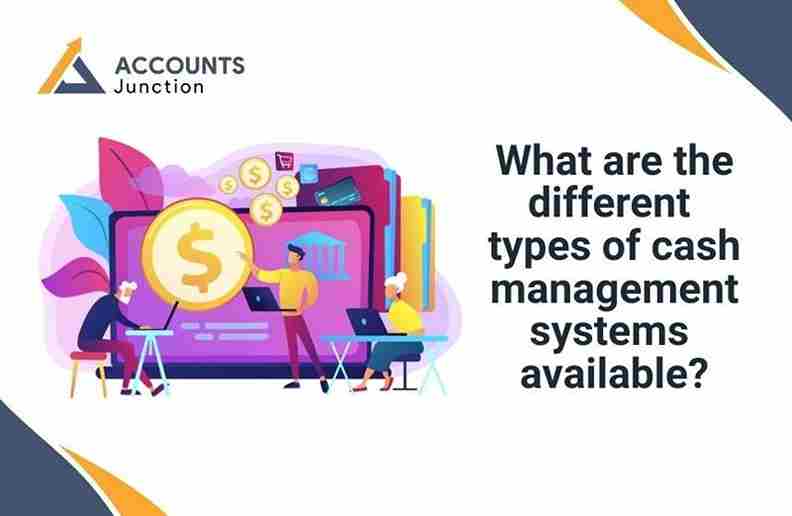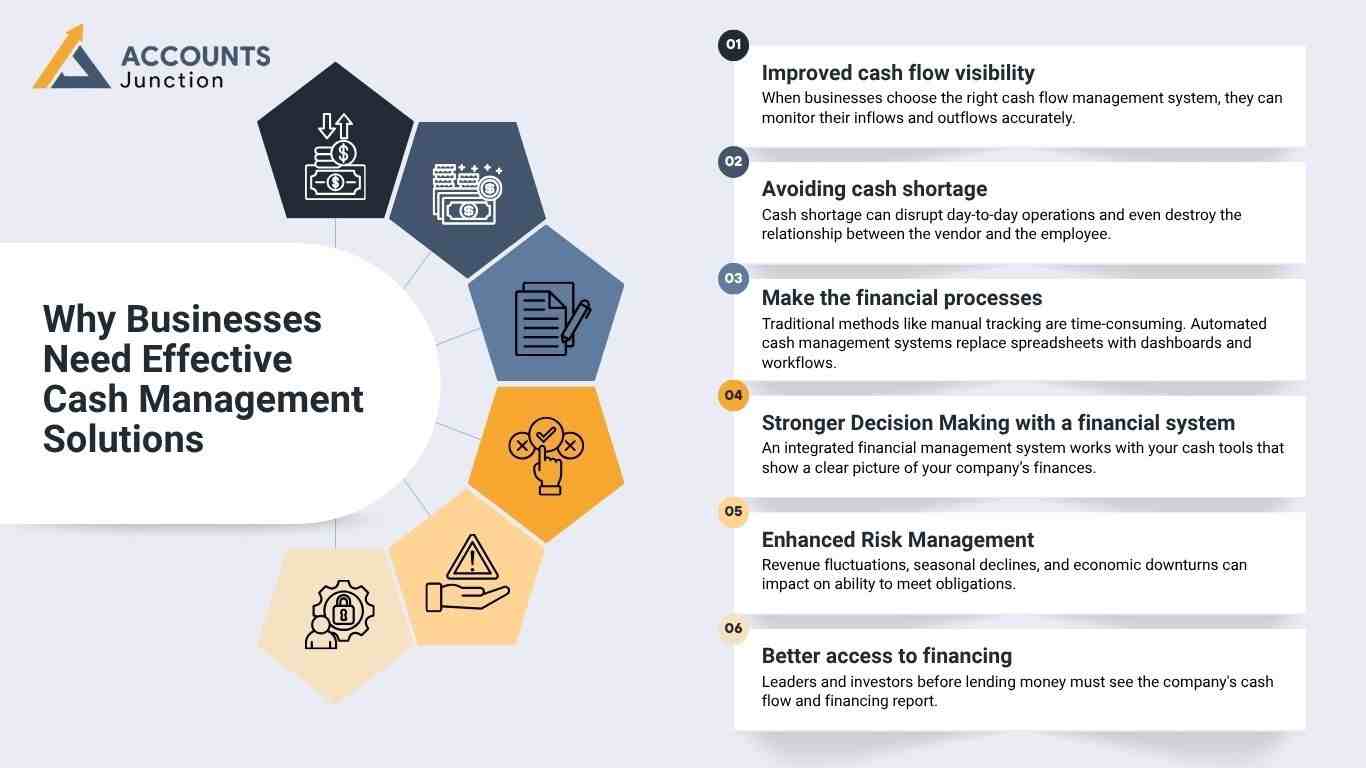
What are the different types of cash management systems available?
Cash management systems enable businesses to effectively monitor their cash flow by tracking, reviewing, and understanding money coming and going out of daily operations. It manages day-to-day liquidity and plans for future expenses. Even profitable businesses can face financial difficulties if cash flow isn’t managed properly. That is why a reliable cash management system is more important than ever. These systems give businesses tools to manage cash effectively. It covers everything from incoming payments and outgoing expenses to cash forecasting.
Whether you are a small firm or a large firm, implementing the right cash management solutions helps you to stay ahead of any financial challenges and achieve long-term growth.
Why Businesses Need Effective Cash Management Solutions
Cash management is not about tracking payments and receivables only. It is about visibility, control, and planning. If a company does not use proper structure for cash management solutions, businesses have to face issues like delayed payments, poor budgeting, or even insolvency.
Here is why businesses are turning to specialized systems:
Improved cash flow visibility
- When businesses choose the right cash flow management system, they can monitor their inflows and outflows accurately. These insights help businesses to make better decisions. Such as when to delay a purchase, invest in a new project, or negotiate supplier terms.
Avoiding cash shortage
- Cash shortage can disrupt day-to-day operations and even destroy the relationship between the vendor and the employee. But with advanced solutions, companies can set alerts for regular customers, automate their transfers. It even forecasts future cash needs to prevent such scenarios.
Make the financial processes
- Traditional methods like manual tracking are time-consuming. Automated cash management systems replace spreadsheets with dashboards and workflows. It increases the accountability and accuracy of accounts.
Stronger Decision Making with a financial system
- An integrated financial management system works with your cash tools that show a clear picture of your company’s finances.
Enhanced Risk Management
- Revenue fluctuations, seasonal declines, and economic downturns can impact on ability to meet obligations. Cash management tools help in anticipating and preparing for changes by analyzing trends and setting contingency plans.
Better access to financing
- Leaders and investors before lending money must see the company's cash flow and financing report. With a proper system and financial management system in place, businesses can get funds quickly and which builds trust and credibility among investors and lenders.

Types of Cash Management Systems
There is no one solution that fits all when it comes to managing business cash flow. Businesses can choose a cash management system based on their size, complexity, and industry needs.
Manual Cash Management System
|
Aspect |
Details |
|
Description |
|
|
How it Works |
Users record cash inflows and outflows manually, updating financial records by hand or through simple tools like spreadsheets. There is no automation for forecasting or real-time cash tracking. |
|
Pros |
- Low cost: Minimal investment needed. - Simplicity: Easy for small businesses to set up without the need for complex software. - No software required: This can be done using basic office tools like spreadsheets. |
|
Cons |
- Time-consuming: Requires manual entry and constant updating. - Liable to error: Human errors in data entry and reconciliation are natural. - Limited visibility: Lacks real-time monitoring and forecasting capabilities. |
|
Best For |
Very small businesses or startups with simple cash flow processes and minimal transactions, suitable for those just starting and with limited cash management needs. |
Automated Cash Management Systems
|
Aspect |
Details |
|
Description |
|
|
How it Works |
|
|
Pros |
- Efficiency: This automates the tasks and reduces manual work. - Accuracy: It reduces errors by eliminating manual entry. - Real-time updates: It provides up-to-date insights into cash flow. |
|
Cons |
- Subscription cost: Typically involves a higher fee for the software. - Learning curve: Some training may be required to fully utilize the system. |
|
Best For |
Small to mid-sized businesses are seeking cash management solutions that offer more automation, accuracy, and real-time data to improve efficiency. |
Bank-Based Cash Management Solutions
|
Aspect |
Details |
|
Description |
|
|
How it Works |
|
|
Pros |
- Strong security: Integrated with banking systems for strong fraud protection. - Direct integration: Syncs seamlessly with your business bank accounts. - Convenient: Easy to manage cash flow from a centralized bank account. |
|
Cons |
- Fixed Approach: Customization options are often restricted. - No integration with other systems: This may not integrate well with third-party tools. |
|
Best For |
Businesses that prefer working directly through their bank and need a simple yet secure way to handle basic payments and transfers without a third-party solution. |
Treasury and Financial Management Systems
|
Aspect |
Details |
|
Description |
Treasury and financial management systems are advanced tools designed to handle the complexities of large-scale financial operations. These platforms are used to manage liquidity, cash positioning, investments, and risk across an entire organization. |
|
How it Works |
|
|
Pros |
- Comprehensive financial control: Provides detailed financial insights for better decision-making. - Real-time reporting: Offers up-to-date financial data for informed strategic planning. - Risk management: Helps identify and mitigate financial risks. |
|
Cons |
- Complex setup: Requires integration with multiple systems and expertise to configure. - Expensive: High initial costs and ongoing maintenance. |
|
Best For |
Large enterprises with complex financial needs and multiple departments or global operations require sophisticated cash and treasury management. |
Cloud-Based Cash Management Platforms
|
Aspect |
Details |
|
Description |
Cloud-based cash management platforms offer a flexible and scalable solution for managing cash flow via the cloud. These platforms allow businesses to track cash, make transfers, and generate reports from any location with internet access. |
|
How it Works |
|
|
Pros |
- Scalable: Grow with your business. - Real-time access: Allows teams to monitor cash flow from any device. - Security: Strong encryption and backup features ensure the safety of financial data. |
|
Cons |
- Dependence on internet access: Requires reliable internet connectivity. - Ongoing subscription costs: Typically involve monthly or yearly fees. |
|
Best For |
Businesses of all sizes are looking for a mobile, flexible, and secure way to manage cash flow that supports remote teams and global operations. |
How to find the most suitable Cash Management System
When a business selects an ideal cash management solution, it depends on its size, complexity, and future goals. Below are some factors that should be considered while choosing the right cash management system :
1. Business Size and Transaction Volume
- Smaller companies might start with simpler automated tools or bank-based systems. Larger organizations may need robust financial management systems with advanced forecasting and reporting features.
2. Integration Needs
- The business ensures that its cash management system integrates well with your existing accounting software, like CRM, ERP, or payroll tools. Integration improves accuracy and manual work.
3. Real-Time Visibility
- Real-time data is necessary for quick decisions. Select a platform that offers live dashboards, automated alerts, and cash flow reports.
4. Security and Compliance
- Look for cash management solutions with strong security features, audit trails, and compliance tools. This is especially important for businesses operating under strict financial regulations.
5. Personalization and Scalability
- Your system should be adaptable to your growing needs. Choose a platform that allows custom workflows, permissions, and future upgrades.
6. Cost and ROI
- Cost is one of the last factors when selecting a cash management system. Compare the pricing models. Some have monthly subscriptions or while others require upfront investment.
Effective cash management is essential for every business. Whether you run a small business seeking automation of basic tasks or a large firm requiring advanced treasury solutions, there are cash management systems designed to meet your needs. At Accounts Junction, we provide a range of services with certified experts to implement solutions that align with your financial requirements. Partner with us to optimize your cash management processes.
FAQ
1. What are e-commerce accounting services?
- They may include bookkeeping, inventory tracking, sales reconciliation, and tax compliance. These services keep online store finances organized.
2. How can e-commerce accounting help my online store grow?
- By providing accurate financial reports and tracking sales, it may help make better decisions. Growth can be smoother with clear insights.
3. Can e-commerce accounting track sales from multiple platforms?
- Yes, it may consolidate data from Amazon, Shopify, eBay, and others. This gives a clear overview of total revenue.
4. Why is inventory tracking important in e-commerce accounting?
- It may show which products sell fast and which remain idle. Proper tracking may prevent stock shortages or overstocking.
5. How do e-commerce accounting services handle returns and refunds?
- They may record returned items, adjust stock, and update revenue. This ensures your financial reports stay accurate.
6. Can accounting services manage marketplace fees and commissions?
- Yes, they may track fees from platforms like Amazon or Shopify. This helps calculate the true profit from each sale.
7. Why is tax compliance important for online stores?
- Different states or countries may have unique tax rules. E-commerce accounting may ensure you avoid penalties.
8. How can e-commerce accounting improve cash flow management?
- It may track money coming in and going out. This helps you plan payments, restock products, and manage expenses.
9. Can outsourced e-commerce accounting save time and cost?
- Yes, outsourcing may reduce the need for full-time staff. Experts may handle complex tasks while you focus on sales.
10. How do accountants reconcile payments from multiple gateways?
- They may match transactions from PayPal, Stripe, and credit cards with orders. This ensures all payments are recorded correctly.
11. Can e-commerce accounting identify profitable products?
- Yes, they may compare costs, fees, and revenue per product. This shows which items contribute most to profits.
12. Why are financial reports important for e-commerce stores?
- Reports may highlight trends, profits, and expenses. They help owners make better decisions about marketing and inventory.
13. How do accounting services track shipping and fulfillment costs?
- They may record all logistics-related expenses. This helps in understanding true product profitability.
14. Can professional accounting prevent mistakes in online store finances?
- Yes, accurate bookkeeping may reduce human errors. This keeps records reliable and up to date.
15. How can e-commerce accounting help with budgeting and forecasting?
- It may predict revenue, costs, and cash flow trends. This assists in planning marketing, stock, and expansion strategies.
16. Do e-commerce accounting services help with compliance across multiple regions?
- Yes, they may manage local, state, or international tax rules. This ensures smooth operations without legal issues.
17. Can accounting services track subscription-based e-commerce revenue?
- Yes, they may monitor recurring payments and cancellations. This provides clear visibility of ongoing income.
18. How does e-commerce accounting handle promotions and discounts?
- It may record discounts and special offers in the books. This helps calculate accurate revenue and profit margins.
19. Can e-commerce accounting improve profitability analysis?
- Yes, by combining sales, costs, and fees, it may identify where profits are higher. This allows strategic adjustments.
20. Why should growing online stores use professional e-commerce accounting services?
- Complex transactions increase with growth. Professional services may keep records accurate, compliant, and easier to manage.
